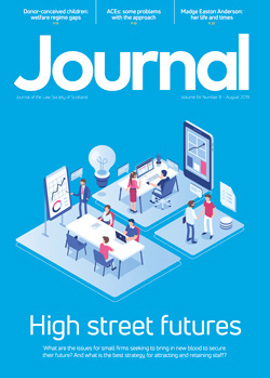Needing a top-up?

Top-up child aliment claims before the sheriff court, in terms of s 2(4)(c)(i) of the Family Law (Scotland) Act 1985, have been rare and in fact there are no reported cases in Scotland. In a recent unreported Paisley Sheriff Court case, S v M (23 May 2019), Sheriff Pender considered the criteria to be applied in such applications.
In this case the parties had one child aged seven years and had been separated for four years. Having already received substantial capital in terms of s 28 of the Family Law (Scotland) Act 2006, the mother raised proceedings for top-up aliment.
The pursuer raised proceedings before a Child Maintenance Service (“CMS”) determination at the maximum award had been made (which is necessary in terms of s 8(6) of the Child Support Act 1991). Once that determination had been made, the pursuer argued that the pre-separation lifestyle of the child, who had been three at the time, had to be maintained. She sought top-up of her CMS award of £1,274 per month by a further £1,800 per month. The pursuer was unemployed, in receipt of a passport benefit and argued that her poor mental health meant that she was unable to work. The defender earned in excess of £3,000 per week but refused to disclose his actual income and resources. The defence advanced was three-pronged: (1) the sum sought was excessive; (2) the pursuer had not demonstrated a “need”; and (3) the capital received under the s 28 action had included a provision for the economic burden of childcare and the pursuer should not have the same money twice.
Assessing “need”
In his decision the sheriff considered he was bound by the provisions of s 4(1) of the 1985 Act. The test to be applied when determining child aliment was no different to the test to be applied when determining spousal aliment. Aliment should not be awarded just because the defender had a high income, and therefore the defender’s refusal to disclose his income and resources was irrelevant to the award to be made. The duty to provide details of income and resources was only relevant had the defender wanted to dispute his ability to pay. Of course, the pursuer did have to vouch her “need” and she only attempted to do so nearly two years after the proceedings were raised. Even then the vouching was incomplete and inaccurate and there was no distinction drawn between her costs and those of the child.
When considering whether the pursuer had a “need”, the sheriff did accept some of the criticisms made of her schedule of expenditure. There was some comment about why a child of seven would require to sleep in silk sheets. He also agreed that purchasing a brand new Mercedes was an “unnecessary extravagance”, but recognised that the monthly repayment was an ongoing expense, nevertheless.
Sheriff Pender did not accept the argument that the capital received under the s 28 action had included a provision for the economic burden of childcare. He considered that the wording of the record and subsequent minute of agreement in that action did not favour that interpretation, as it did not specifically state that it was in satisfaction of that part of the claim.
The sheriff ultimately made an award in favour of the pursuer for a top-up payment of £400 per month, which was less than the sum offered by the defender extrajudicially.
Expenses
Another interesting point arising from this case is the question of expenses. The defender sought expenses from the pursuer. Despite the pursuer being in receipt of a passport benefit, she had not applied for legal aid. The court was told that the pursuer “did not wish to trouble” the public purse.
It was argued for the pursuer that she would have difficulty in meeting an award of expenses, but the court was reminded, and accepted, that this is not a matter which should be taken into account (B v B 2012 Fam LR 125). Sheriff Pender accepted that the conduct of the case by the pursuer did her “no credit”. He ultimately awarded expenses in favour of the defender, which serves as a stark reminder that a court can and will depart from the more likely finding of no expenses where there are clear and compelling reasons to do so.
Regulars
Features
Briefings
In practice
In this issue
- The Judicial Disappointments Board
- Hiding in plain sight
- Food for thought on the drug front
- Salmon farming law must change
- People on the move - Aug 19
- Managing compliance to drive legal practice success
- New practice area: financial services – asset management
- Resilience: your flexible friend
- Appreciation: William Denys Cathcart Andrews







